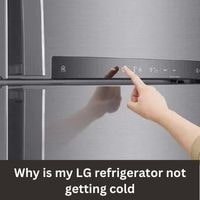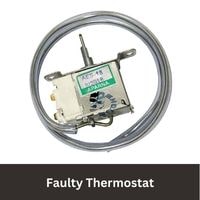Why is my lg refrigerator not getting cold
Why is my LG refrigerator not getting cold. If your LG refrigerator is not getting cold, it can be a frustrating and inconvenient issue.
The refrigerator not getting cold could be caused by several different factors, and understanding what is causing the issue and how to fix it can help you get your refrigerator back to operating smoothly.
Why is my LG refrigerator not getting cold

In this article, we will discuss the potential causes of an LG refrigerator not getting cold and provide some solutions to fix it.
Dirty Condenser Coils
One potential cause of an LG refrigerator not getting cold could be dirty condenser coils. The condenser coils are the devices that help to dissipate heat from the refrigerant inside the refrigerator.
If the condenser coils are dirty, they may not be able to effectively dissipate heat, which can cause the refrigerator to not get cold. To fix this issue:
- Check the condenser coils for any visible dirt or debris. If you notice any dirt or debris on the condenser coils, use a condenser coil brush or a small vacuum to gently clean them.
- Check that the condenser coils are properly aligned and tightened. If the condenser coils are misaligned or loose, you can try adjusting them to see if it resolves the issue.
Faulty Evaporator Fan Motor
Another potential cause of an LG refrigerator not getting cold could be a faulty evaporator fan motor. The evaporator fan motor is the device that helps to circulate the air inside the refrigerator.
If the evaporator fan motor is not functioning properly, it can cause the refrigerator to not get cold. To fix this issue:
- Check the evaporator fan motor for any visible damage or issues. If the evaporator fan motor appears to be damaged or not functioning properly, it may need to be replaced.
- Check that the evaporator fan motor is properly aligned and tightened. If the evaporator fan motor is misaligned or loose, you can try adjusting it to see if it resolves the issue.
Frozen Evaporator Coils
Another potential cause of an LG refrigerator not getting cold could be frozen evaporator coils. The evaporator coils are the devices that help to dissipate heat from the refrigerant inside the refrigerator.
If the evaporator coils are frozen, they may not be able to effectively dissipate heat, which can cause the refrigerator to not get cold. To fix this issue:
- Check the evaporator coils for any visible ice or frost. If you notice any ice or frost on the evaporator coils, use a hairdryer or other small heating device to gently melt it.
- Check that the evaporator coils are properly aligned and tightened. If the evaporator coils are misaligned or loose, you can try adjusting them to see if it resolves the issue.
Faulty Thermostat

Another potential cause of an LG refrigerator not getting cold could be a faulty thermostat. The thermostat is the device that helps to regulate the temperature inside the refrigerator.
If the thermostat is not functioning properly, it can cause the refrigerator to not get cold.
To fix this issue:
- Check the thermostat for any visible damage or issues. If the thermostat appears to be damaged or not functioning properly, it may need to be replaced.
- Check that the thermostat is properly aligned and tightened. If the thermostat is misaligned or loose, you can try adjusting it to see if it resolves the issue.
Faulty Compressor
Another potential cause of an LG refrigerator not getting cold could be a faulty compressor. The compressor is the device that helps to compress and circulate the refrigerant inside the refrigerator.
If the compressor is not functioning properly, it can cause the refrigerator to not get cold.
To fix this issue:
- Check the compressor for any visible damage or issues. If the compressor appears to be damaged or not functioning properly, it may need to be replaced.
- Check that the compressor is properly aligned and tightened. If the compressor is misaligned or loose, you can try adjusting it to see if it resolves the issue.
Conclusion
If your LG refrigerator is not getting cold, it could be caused by several different factors, including dirty condenser coils, a faulty evaporator fan motor, frozen evaporator coils, a faulty thermostat, or a faulty compressor. To fix these issues, you may need to clean out any dirt or debris from the condenser coils, replace any faulty evaporator fan motors, melt any ice or frost on the evaporator coils, adjust the position or alignment of these components, or have a professional examine and repair the thermostat or compressor. It is important to properly diagnose and fix the issue to ensure that your refrigerator is functioning correctly and efficiently.
Related Guides


